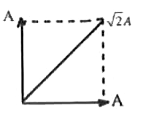The total mechanical energy of a spring mass system in simple harmonic motion is E=12mω2A2. Suppose the oscillating particle is replaced by another particle of double the mass while the amplitude A remains the same. The new mechanical energy willSolution in Tamil
become 2E
becoem E2
becoem √2E
remain E
The correct Answer is:D
Step by step video & image solution for The total mechanical energy of a spring mass system in simple harmonic motion is E=1/2momega^2 A^2. Suppose the oscillating particle is replaced by another particle of double the mass while the amplitude A remains the same. The new mechanical energy will by Physics experts to help you in doubts & scoring excellent marks in Class 11 exams.
Updated on:21/07/2023Topper's Solved these Questions
- SIMPLE HARMONIC MOTIONBOOK - HC VERMACHAPTER - SIMPLE HARMONIC MOTIONEXERCISE - Objective-2
16 Videos
- SIMPLE HARMONIC MOTIONBOOK - HC VERMACHAPTER - SIMPLE HARMONIC MOTIONEXERCISE - Exercises
58 Videos
- SIMPLE HARMONIC MOTIONBOOK - HC VERMACHAPTER - SIMPLE HARMONIC MOTIONEXERCISE - Question for short Answer
17 Videos
- ROTATIONAL MECHANICSBOOK - HC VERMACHAPTER - ROTATIONAL MECHANICSEXERCISE - Exercises
86 Videos
- SOME MECHANICAL PROPERTIES OF MATTERBOOK - HC VERMACHAPTER - SOME MECHANICAL PROPERTIES OF MATTEREXERCISE - Exercises
32 Videos
Similar Questions
Select the correct statements
View SolutionA particle executes simple harmonic motion with an amplitude of 10 cm and time period 6s. At t=0 it is at position x=5 cm going towards positive x-direction. Write the equation for the displacement x at time t. Find the magnitude of the acceleration of the particle at t=4s.
View SolutionA person goes to bed at shasrp 10.00 pm every day. Is it an example of periodic motion? If yes, what is the time period? If no why?
View SolutionA wheel is making revolutions about its axis with uniform angular acceleration. Starting from rest, till it reaches 100 rev/sec in 4 seconds. Find the angular acceleration.
View SolutionA load of 10 kg is suspended by a metal wire 3 m long and having a cross sectional area 4mm2. Find a. the stress b. the strain and c. the elongation. Young modulus of the metal is2.0×1011Nm−2
View SolutionA particle of mass 40 g executes a simple harmonic motion of amplitude 2.0 cm. If the time period is 0.20 s, find the total mechanical energy of the system.
View SolutionTwo simple harmonic motion y_(2) A sin omegat and y_(2)=A cos omegat are superimposed on a particle of mass m . The total mechanical energy of the particle is:
View SolutionTwo simple harmonic motions y_(1) = Asinomegat and y_(2) = Acos omega t are superimposed on a particle of mass m. The total mechanical energy of the particle is
View SolutionPassage I) In simple harmonic motion force acting on a particle is given as F=−4x, total mechanical energy of the particle is 10 J and amplitude of oscillations is 2m, At time t=0 acceleration of the particle is −16ms2. Mass of the particle is 0.5 kg.
Potential energy of the particle at mean position is
View SolutionPassage I) In simple harmonic motion force acting on a particle is given as F=−4x, total mechanical energy of the particle is 10 J and amplitude of oscillations is 2m, At time t=0 acceleration of the particle is −16ms2. Mass of the particle is 0.5 kg.
At x=+1m, potential energy and kinetic energy of the particle are
View SolutionThe total mechanical energy of a particle of mass m executing SHM with the help of a spring is E=(1/2)mω2A2. If the particle is replaced by another particle of mass m/2 while the amplitude A remains same. New mechanical energy will be :
View SolutionShow that the total mechanical energy remains constant for a particle executing simple harmonic motion.
View SolutionA particle of mass 40 g executes a simple harmonic motion of amplitude 2.0 cm. If the time period is 0.20 s, find the total mechanical energy of the system.
View SolutionIn a simple harmonic motion, the force acting on a particle is given as F =−4x, total mechanical energy of the particle is 10J and amplitude of oscillation is 2m. At time t = 0 acceleration of the particle is −16m/s2. Mass of the particle is 0.5 kg.
Potential energy of the particle at mean position is :
View SolutionIn a simple harmonic motion, the force acting on a particle is given as F = -4x , total mechanical energy of the particle is 10J and amplitude of oscillation is 2m. At time t = 0 acceleration of the particle is -16m//s^2 . Mass of the particle is 0.5 kg. At x = +1m, potential energy and kinetic energy of the particle are
View SolutionTwo simple harmonic motions y1=Asinωt and y2=Acosωt are superimposed on a particle of mass m. Find the total mechanical energy of the particle.

View Solution
